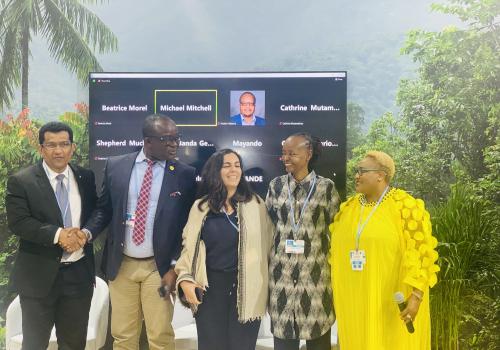Southern African Development Community (SADC) Member States must work together and support joint efforts by the private and public sectors, non-governmental organisations and international organisations to have a greener Africa, Mr Emilio Sempris, the Regional Director of the Coalition for Rainforest Nations for Latin America and the Caribbean, has said.
Mr Sempris said this during a side event held on the margins of the UN Conference on Climate Change 27th Conference of Parties (COP27) meeting in Sharm el-Sheikh, Egypt. The side event was hosted by the SADC Secretariat on 11th November 2022 to accelerate implementation of the Great Green Wall Initiative (GWWI) in the SADC Region. The objective of the event was also to strengthen networks for cooperation among stakeholders, including raising awareness and build capacity on sustainable land management initiatives and programmes in the SADC Region..
He said his organisation supports SADC’s GGWI which is aimed at greening the Southern African sub region to curb desertification, and that this needed joint efforts by all as it was impossible for one institution or a coalition to solve it alone. The SADC GGWI is modelled alongside the GWWI of the Sahel Region in nothtern Africa which seeks to restore 100 million hectares of currently degraded land; sequester 250 million tonnes of carbon and create 10 million green jobs by 2030.
The Coalition of Rainforest Nations, Mr Sempris, said raised US$500 million through the Green Climate Fund (GCF) and the Paris Agreement, but unfortunately no African country has benefitted from this. The US$500 million was distributed among eight countries, seven of which are in Latin America, and one in Asia. The Coalition would therefore continue to work with SADC on the GWWI and to jointly mobilise resources to help in the fight to mitigate the effects of climate change.
Mr Sempris, who is the former Minister of Environment of Panama, said his country contributed US$1 million to the GCF to send a message that if Panama, a developing country, can contribute to the GCF, then developed countries can do more.
The SADC GGWI was developed to streamline and harmonize policy issues among Member States. There have been various initiatives in the past, including the Sahel GGWI but these were done at national levels. There was therefore a realisation that measures to mitigate effects of climate change cannot be with silo mentalities with each country dealing with its own climate change issues, hence the formation of the SADC GGWI to address these challenges.
A representative from the Commonwealth, Ms Helene Gichenje, said her organisation also supports the GWWI and outlined the activities currently underway to support the SADC initiative. She said at the COP26 last year, the Commonwealth Secretariat, the UNCCD and AUDA NEPAD signed a tripartite agreement to support African countries on sustainable land and water management use and that the SADC GGWI is the first part towards the implementation of activities under the agreement.
Most importantly, she added, the Commonwealth Secretariat signed a charter with Member States at the last Commonwealth Heads of Government Meeting (CHOGM) in Rwanda and this calls on member countries to integrate implementation of the three Rio de Janeiro Conventions on climate change. The Commonwealth will support the GGWI through the climate finance hub under which technical advisors are deployed to Member States to support them with climate finance under a demand-driven process whereby countries request for support to meet specific needs. It works across areas, namely project development, capacity support, and technical and policy development.
Ms Gichenje said the Commonwealth had technical advisors in 11 Commonwealth countries, and five of them were in SADC Member States, namely Eswatini, Mauritius, Namibia, Seychelles and Zambia where they are embedded with the Ministries of Environment to support projects development as well as elaboration of national action and investment plans to access resources.
She pointed out that at the COP27 in Egypt, the Climate Investment Fund announced that it will support one regional climate initiative which involves Malawi, Mozambique, Namibia, United Republic of Tanzania and Zambia which was developed with the support from UNCCD, the Commonwealth, and African Development Bank (AfDB). She hoped that these countries will address the pillars under the GGWI as money was being mobilised to support the initiative.
Ms Medine Valas from the Food and Agricultural Organisation (FAO) said her organisation had a long standing and fruitful partnership with SADC and was working on a number of forestry and climate change projects which support the objectives of the GGWI. FAO had a Memorandum of Understanding with SADC Secretariat to collaborate in agriculture, food security and natural resources and work on the GWWI is one of the top priority areas.
“SADC and FAO are currently implementing a regional technical co-operation project to support SADC and its Member States in planning, coordination and tracking progress in the implementation of GGWI. Part of the exercise we are doing now and in collaboration with the SADC Secretariat is to mobilise additional financial and technical resources in order accelerate implementation of the GGWI. This project will also extend to good work done already on Africa data for environmental land and agriculture whereby data for the environment and agriculture will be collected, used, analysed and mapped to inform with participatory decision-making and planning of actions.
FAO was also working on dry land initiatives and supporting SADC forestry through other land and forest programmes with a total portfolio value of US$130 million worth of investment and all these projects are contributing to the goals of the GGWI. She said it was important to turn strategy at regional and national levels into actions and support all countries to identify, support and implement GGWI priorities. Awareness raising, communication and coordination among stakeholders, including government institutions, was also key to success. A strong link between the environment and technical support is required to accompany communities and institutions implementing GGWI at the ground, she said.

